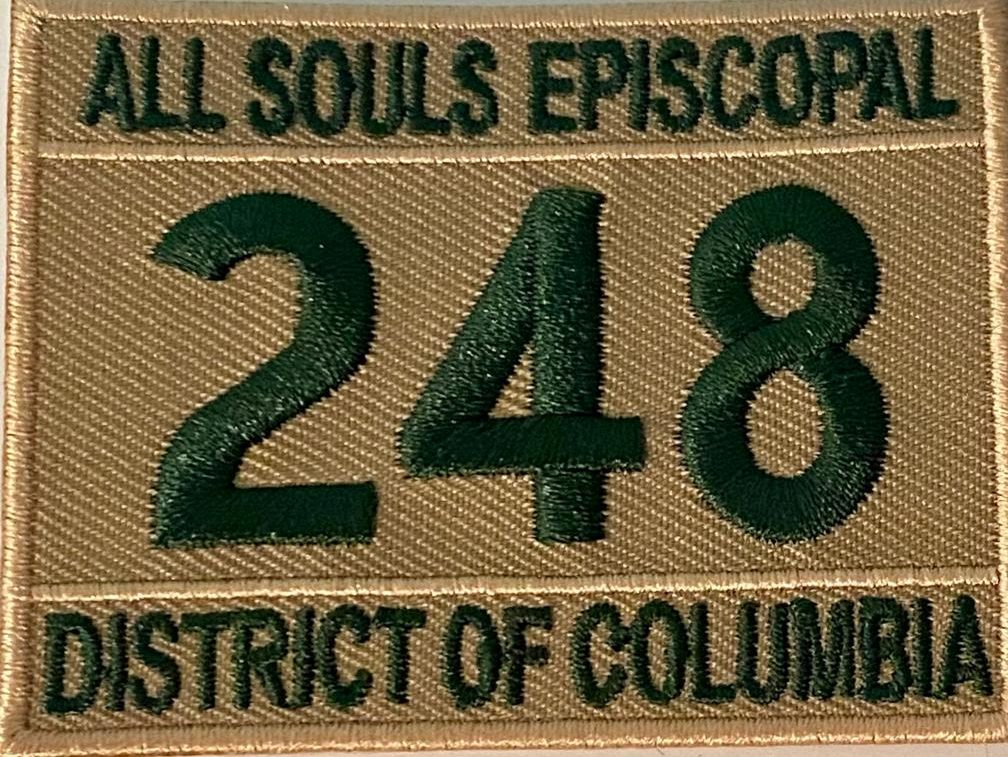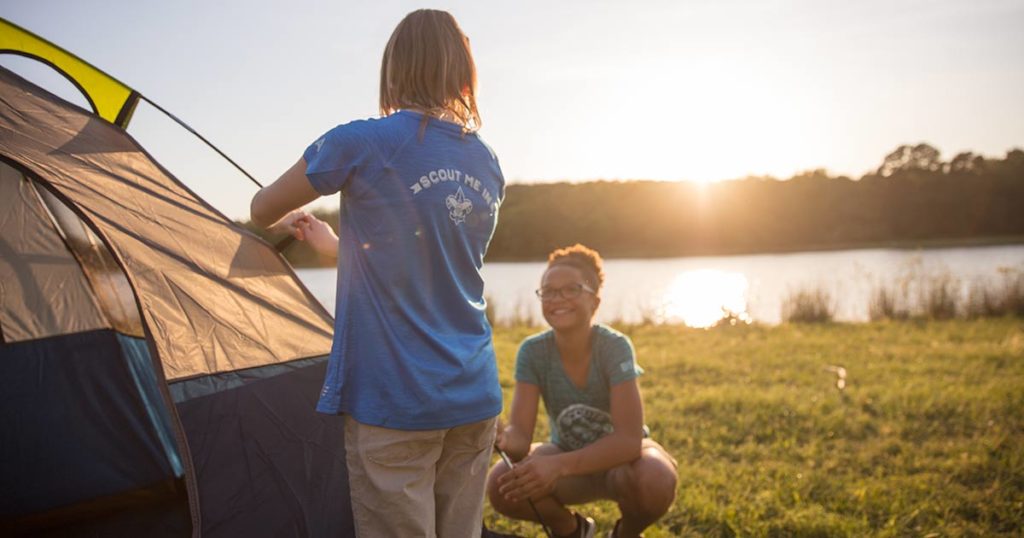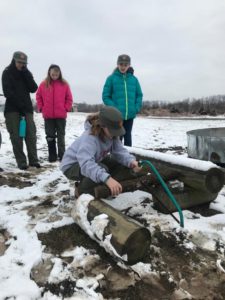Our Troop Goes Camping and Hiking in the Outdoors
One of the great things about scouting is the outdoor activities we go on. Two things we do very often are camping and hiking.
We go camping once a month to lots of different places. While camping Scouts can learn valuable skills, such as how to start a fire, how to cook a meal, and much more! Camping Trips are also a way for scouts to check off Merit Badge or Advancement requirements and earn awards. Another fun thing our Scout troop does is Hiking. In September 2019, we went to Shenandoah. Camping and Hiking are great ways to connect with the outdoors.
One of these campouts will be a “camporee”, which is when several Troops camp together at the same time and have Scouting skill competitions such as archery, fire-building, geocaching, and more! In late June we always go to Goshen Scout Reservation for a week of summer camp. These places are all within a two-hour drive.
Signing-Up, Paying and Transportation
When you join Troop 248, your Parents (or the other adult who is helping you) and you will be granted access to the private section of our website called “Scoutbook.”. It also works on a smartphone. There you can look at the detailed calendar and itinerary of all of our upcoming special events and trips. You can sign-up to participate in each event and pay the necessary fee online with a credit card. Not all events have a fee, but activities like overnight campouts have a $50 fee because it includes your food, the Troop’s rental of the camp facilities and other things.
Our weekend campouts are always within a 2-hour drive of All Souls Episcopal Church, and the Scoutbook pages will give your parents the place where (and when) you need to meet everyone at the selected camp. Usually, parents driving a group of Scouts to a camp will not stay overnight but will return to pick you and others up at an agreed time. Parents and other adult volunteers take turns driving groups of Scouts to and from each outing, so don’t worry if your family can’t arrange to drive you to every event.
Basic Camping and Hiking Equipment Every Girl Needs to Start Out
We do a lot of activities outside. We have daytime activities like hiking and service projects and overnight stays in tents (and sometimes in cabins). Back in the “old days,” campers brought a lot of heavy and bulky equipment with them. The girls in Troop 248 go lightweight. We only bring the basic things we need when we travel because it is a lot more fun that way.
You need to obtain some items – but do not have to spend a lot of money. All of the things listed below can be expensive at fancy shops, but you can often get used things at low cost (or even for free) at garage sales or from a friend or neighbor who no longer wants these things. For each item, we provide a recommended item that is available from the Scout Shop and also on scoutshop.org/camping. The things we recommend are lightweight, don’t take up much room, and are really nice looking. It is best to obtain just the essentials recommend below because you can always get more things later. And you can attend one of our meetings (or our open houses/orientation sessions) and discuss things with our Scoutmaster Staff. Here is what we recommend every Girl have:
- A Sleeping Bag. We recommend a “three season” sleeping bag that you can use in the spring, summer, and fall. If you want to buy a new one from the Scout Shop, we recommend the BSA 30-degree adult mummy sleeping bag, item number 619380 for $69.99. It is bright yellow-green and cheerful. You can get something similar at camping stores and places like Wal-Mart.
- A Ground Pad. This is a simple foam pad that you roll-out on the ground in a tent and put your sleeping bag on top of. It keeps you warm from the cold ground, dry from dampness and comfortable because of the padding. If you want to buy a new one from the Scout Shop, we recommend Therm-a-rest RidgeRest SoLite Sleeping Pad – Regular, item number 619468 for $19.99. Nothing fancy. You can get these at camping stores and places like Wal-Mart.
- A Daypack. To start out, you only need a simple backpack that can contain the basic things you need to bring on hikes and short camp-outs. You can even start out by using a large school backpack that you already own. After you have gone on some campouts and hikes you might want to get something bigger, but a Daypack will always be useful for you. If you want to get a new one from the Scout Shop we suggest the Kelty 15L Summit Daypack Green/Grey, item number 639825 for $29.99. It is a bright green and has a very cool Scouts BSA logo on the back side. It is strong and very lightweight, which will be good for our long hikes.
- A Pocket Knife. Every girl needs one of these when we are on campouts. Get a sturdy one that you don’t mind getting dirty that has the basic knife blades. We strongly recommend the BSA deluxe Pocket knife, 2 ½” knife, item number 615782 for $19.99. It is the same pocket knife your great-grandmother and great-grandfather used when they were in Scouts and now you can have one. Don’t use it until the Scoutmaster Staff teaches you how to use it – we don’t want any fingers missing from our girls!
- A Water Bottle. Any lightweight water bottle will do. The simple ones you can get at the grocery store are just fine for you to start with. No need to spend much on this item. The Scout Shop has a bunch of inexpensive ones.
- A Rain Suit. You will end up on a hike or on a campout when it rains. A bunch. There is nothing worse than being wet, cold and miserable and that is what you will be if you are not prepared. So, you need a “rain suit”, which is not like what most girls wear to school. A rain suit is a very light jacket with matching pants that fit over the clothes you are wearing when it rains. These should be very thin and lightweight so they do not take up much space in your Daypack or weigh you down on a hike. We suggest Frogg togs Driducks Rain Suit, Youth, available at www.ScoutShop.org, item number 622118 for $19.99. Please do not buy a “poncho” for your rainwear. They do not keep you dry enough.
- Hiking Boots. These should be sturdy boots that have thick rubber soles for hiking in wet, rocky terrain. They should support (come above) your ankle and fit well. This is one item that you do not want to get wrong. Hiking boots can be extremely expensive, which is great if you are a professional mountain-climber but terrible if you are a DC girl just wanting to have fun. And, the hiking boots at discount shoe stores like Target and Comfort One are often plastic, uncomfortable and just fall apart. The Scoutmaster Staff will share thoughts on what you might obtain at our open houses. So unless your family knows what it is doing you might wait. If you want to get something now we think the LL Bean store in Tyson’s Corner has knowledgeable people and affordable products. The Scout Shop does not sell footwear.
- A flashlight. The lighter the better. Small ones with LED lights and 2 or 3 AA batteries are the best. You do not need to spend more than $10. If buying from the Scout Shop, we like the Cub Scout LED Gel Flashlight, Blue, item #613871 for $7.99.
Tents
In the “old days” Scout Troops had a lot of big old expensive tents made of heavy canvass that got soaked with water and were a big mess at the end of a weekend campout. Today is a lot better. Tents are made of very lightweight materials and are comparatively much less expensive and really easy to set-up. Best yet, they are compact and fit into teeny-weeny stuff-bags that easily fit into a girl’s closet along with her teeny-weeny sleeping bag and compact Daypack.
Our Troop currently has a collections of 30 2-people tents that we bring to campouts so no need to buy a tent.
Packing Lists
Day Hike Packing List
- Small hiking backpack.
- Scout Pocketknife, small flashlight, and matches.
- Lightweight rain suit.
- Hiking Boots that are already broken-in.
- Clothing appropriate for the weather expected during the hike.
- Snacks like granola, dried fruits, and food bars.
- Bandaids in case of blisters.
- Sunscreen with SPF 50 or higher.
- Hat with visor or brim.
- Map
- Water bottle
Weekend Campout Packing List
- Medication
- Clothing & Personal (best if tagged with the Scout’s name)
- Dress Uniform (Class A)
- Informal Uniform Shirt (Class B shirt)
- Sweater or Sweat Shirt
- Jacket if warm, Heavy Coat if cold
- 2 Pairs of Socks
- 2 Pairs of Underwear
- 2 T-shirts
- 1 Pair of Jeans or Long Pants
- 1 Pairs of Shorts (if warm weather)
- Green Scout Belt
- Sneakers / Gym Shoes
- Hiking Boots
- Rainsuit
- Pajamas / Sleepwear
- Hat
- Personal Toiletries
- Soap (in Plastic Case / Bag)
- Shampoo (Small Bottle)
- Washcloth & 2 Towels
- Dental Floss
- Toothbrush & Toothpaste
- Comb / Brush
- Insect Repellant
- Sunscreen (SPF 50 or higher)
- Kleenex / Tissues
- Required Gear
- Sleeping Bag
- Pillow
- Backpack or Duffle Bag
- Drinking Cup (plastic)
- Flashlight & Extra Batteries
- Canteen or Water Bottle
- Personal
- Scout Handbook (a must)
- Pen or Pencil
- Scout Pocket Knife
- Sunglasses
Residential Summer Camp Packing List
- Medication
- Clothing & Personal (best if tagged with the Scout’s name)
- Dress Uniform (Class A)
- Informal Uniform Shirt (Class B shirt)
- Sweater or Sweat Shirt
- Jacket or Windbreaker
- 6 Pairs of Socks
- 6 Pairs of Underwear
- 6 T-shirts
- 1 Pair of Jeans or Long Pants
- 2 Pairs of Shorts
- Green Scout Belt
- Swimming Suit & Beach Towel
- Sneakers / Gym Shoes (1 Pair to Wear and 1 Pair for Spare)
- Hiking Boots
- Closed-toed water shoes (ex. Crocs, Keens) (note: most camps don’t accept flipflops as water shoes for water activities)
- Shower Shoes / Flipflops
- Rainsuit
- Pajamas / Sleepwear
- Hat
- Personal Toiletries
- Soap (in Plastic Case / Bag)
- Shampoo (Small Bottle)
- Washcloth & 2 Towels
- Dental Floss
- Toothbrush & Toothpaste
- Comb / Brush
- Laundry Bag
- Insect Repellant
- Sunscreen (SPF 50 or higher)
- Kleenex / Tissues
- Required Gear
- Sleeping Bag or 2 Warm Blankets
- Pillow
- Backpack or Duffle Bag
- Drinking Cup (plastic)
- Flashlight & Extra Batteries
- Canteen or Water Bottle
- Personal
- Scout Handbook (a must)
- Pen or Pencil (a must)
- Notepad or Paper (a must)
- Wristwatch
- Alarm Clock
- Camera & Film
- Sewing Kit
- Scout Pocket Knife
- Sunglasses
Transportation Safety and Pick-Up and Drop-Off Points for Outings
When the Troop has a scheduled event we always send a special e-mail to all parents and guardians of our members. How you travel to an event depends on the kind of event. The following are the kinds of places you will visit and how the Troop travels to get there.
- Day Hikes. A day hike is a trip to a nearby, but special, location where the Troop will take a hike that is longer than usual. If we go to a location within the City, such as Rock Creek Park, the day hike will rarely be longer than five miles. Transportation to day hikes in the City is by carpooling, individual driving, or by Metro/Metrobus.
If the Troop goes outside the City to a nearby wilderness area, the day hike could be as long as seven to ten miles. Transportation is by carpooling or by driving individually to the precise location in the Transportation Link. If a person driving is uncertain about how to get the location, please know that one member of the Scoutmaster Staff or Troop Committee will always depart the All Souls parking lot at a precise time so drivers can always follow-along. - Weekend Campouts. Campouts are great times for girls who participate and are always held at a BSA Camp or similar facility within a two-hour drive of the City. Campouts are almost always two nights (Friday and Saturday night) when the girls sleep in tents (when warm enough) or cabins (only in winter). All scouts should arrive between approximately 8:30 and 9:00 PM on Friday nights at the campsite. Weekend campouts always end on Sunday after Sunday breakfast. All drivers must arrive to pick up the girls no later than 10:00 AM on Sunday. Each girl and driver needs to sign-out before departing the camp.
- Longer Trips. The Patrol Leaders Council and Scoutmaster Staff will plan transportation arrangements for trips farther than two hours from the City. A troop-wide email will provide the details and will be sent in advance. Carpooling and organized van or bus arrangements will be made as appropriate.
Transportation Safety
Driving: The Troop follows the transportation safety rules of the BSA and the Episcopal Church. As a result, no person under the age of 18 may drive any vehicle during any Troop outing. All drivers must possess a current driver’s license and must not drive any commercial-size vehicle unless they possess the required license designation. All applicable driving rules and regulations must be followed. No driver may be under the influence of any alcohol or judgment-impairing drugs (legal or otherwise) of any type during driving or otherwise accompanying any Scout.
Public Transportation. Travel by the Washington Metro, Metrobus and suburban buses that link to the Metro system is safe – especially during the times we have scheduled for our Troop meetings, outings, and other activities. It is Scout-like to travel on Metro because it saves your family money and reduces air pollution. The Scoutmaster staff talked to the Metro Police, and they and the Metro Station managers and Metrobus drivers are on the lookout to protect and assist any Scouts who are traveling on the Metro system.
Here are some good practices to follow if you are using Metro:
- Fare Card. Have your fare card fully charged. If you are a District of Columbia student, your complimentary student metro card works to come to our events.
- Travel in Groups. It is always best to travel with an adult and your fellow Scouts to Troop events. Ask the Scoutmaster Staff to help you organize travel groups from your neighborhood.
- Travel in Daylight. Girls should do their best to travel during the daytime hours. If a special Troop event is scheduled during the evening, you should travel with an adult.
- Wear Your Uniform. Metro Police and Station managers know Scouts are special people and they always go out of their way to help you if you need something. And, it is fun to show off your uniform to everyone who sees you!
- Stay Near Other People. Stay near groups of friendly-looking people or Metro employees when waiting for the train or bus. Sit close to the driver on a Metrobus.


